Welcome to the cKotch.Com blog. I’m Christopher Kotcher, and this is how I write.
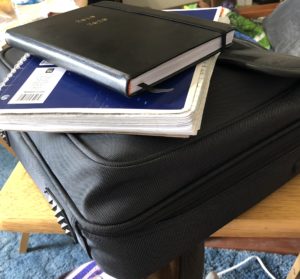
Not Just Inspiration
I cover inspiration a lot on this blog. There’s a reason my tagline is “Writing and Inspiration.”
Many posts are stories of my life or interests which have shaped my writing or my thinking. I want to show how people can make something meaningful out of their experiences and their entertainment.
Today though, I wish to discuss a bit about the process of writing.
All sorts of routines exist for all kinds of writers. I’ve tried a fair amount of them. Mainly I’ll share what I’ve stumbled on and how it works for me.
For fellow writers and would-be writers, I hope this post can help guide you to discovering what works best for you.
For everyone else, I ask you to see what I have to say about my creative process. See what goes into my writing and maybe get an idea what it takes to pursue a passion.
Planning Plans, Often in a Planner
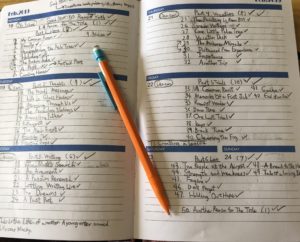
Before writing proper begins, I find it useful to do some planning.
There are moments where I’ll get a good spontaneous burst of inspiration. I’ll just start writing and writing for hours on end without any thought needed.
Thing is, those moments are rare blessings. They aren’t something to totally rely on. Inspiration can be found anywhere, but you can’t expect it to knock you in the face every time.
Much of my current work is based on revising stories I’ve told my whole life.
Revising goes beyond simply dotting “i”s, crossing “t”s, and placing periods. To revise is to look at a work through new eyes, to fundamentally reshape it and make it something grander.
In other words, you could think of a revision like a reboot before a work is published.
Such writing demands a great deal of planning. I need to set a roadmap for how to move things around and which themes to include. I don’t want to feel lost in redoing something I loved to write.
Plot details are jotted down. Character changes are considered. Chapter titles are tested.
I may even doodle a couple characters to get a better idea of their abilities and how they can interact with the world around them.
Often, I’ll place all this planning in my planner for the year. This has proved a good way to fill unused space and have reliable access to my plans.
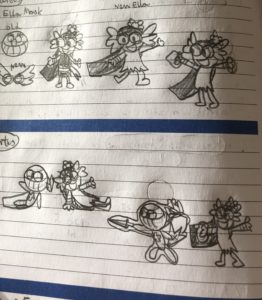
Starting with Notebooks
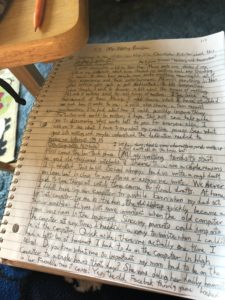
All my writing starts in good old-fashioned notebooks. I jot down plans, doodle some characters, and write up a first draft all on those loose-leaf sheets.
There are a couple reasons I’ve adopted this habit.
In school, we wrote rough drafts of stories and essays on loose leaf in class. We never had to type things out until time came for final drafts.
At home, I didn’t have my own computer for a while.
Even when my dad set up a computer for me in the den, that desktop quickly became the family machine. It was just more convenient when the old computer room was all the way down in the basement.
Since my parents could jump on my computer anytime, I needed a way to write when I couldn’t be at the computer.
(Quick aside, there was actually one time I couldn’t type an essay final draft for a few hours because my mom needed the computer. She had to do her daily harvest in her Farmville town on Facebook’s games section.)
Now, so far, I’ve been listing reasons why I started including notebooks in my writing process. Why would I continue this process when I now have more freedom to write how I want?
First things first, I find it easier to carry around a notebook compared to my laptop. I can write in a notebook anywhere. I don’t need to find a place to set it up or plug it in.
Notebooks can be easily used in a car, on a couch, on the floor. They can meet inspiration as it comes. Laptops need a space to lay flat and an outlet if I’m going to be on it for a while.
(My phone’s out of the question for anything beyond notes. Typing is a larger project on such a small device can prove annoying.)
All this is especially true on vacations. Notebooks fit well into a small backpack or carry-on bag. Laptops take up way too much space in a suitcase and prove a pain to get through airport security.
Another advantage of notebooks is the ability to manipulate them. I can cross things out, make notes or insertions in the margins, tear out pages to compare them.
I know there are ways to do similar things on computers with tools like Track Changes and View Side by Side. Still, those tools tend to feel limited to me. They allow me only to do what their creators have envisioned.
The Typical Typing Session
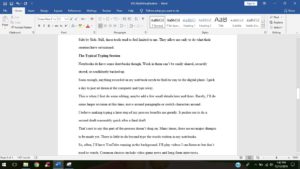
Notebooks do have some drawbacks though. Work in them can’t be easily shared, securely stored, or confidently backed up.
Soon enough, anything recorded in my notebook needs to find its way to the digital plane. I pick a day to just sit down at the computer and type away.
This is when I first do some editing, maybe add a few small details here and there. Rarely, I’ll do some larger revision at this time, move around paragraphs or switch characters around.
I believe making typing a later step of my process benefits me greatly. It pushes me to do a second draft reasonably quick after a final draft.
That’s not to say this part of the process doesn’t drag on. Many times, there are no major changes to be made yet. There is little to do beyond type the words written in my notebooks.
So, I’ll usually have YouTube running in the background. I’ll play videos I can listen to but don’t need to watch. Common choices include video game news and long-form interviews.
Once I’m all set, I sit back and copy my stuff across my three personal flash drives to keep everything safe. That would be one for my pencil pouch, one for laptop case, and one for my home.
I’ve written a lot over the years. Really can’t afford to lose any of it.
Even cancelled projects can later become something new or be incorporated into something else. Best example would be my first project “The Lost Puffin.”
Evolving My Editing
Now for a step not so well defined.
Editing is one of the most important parts of writing. That grand old time when every little flaw in your work is exposed before the public can point and laugh at them.
If you’ve got a good editor, this is also where you are first challenged over those dumb ideas you tend to deem brilliant.
Example: “What do you mean this sentence flows like Ambrosia, the sweet nectar of the Greek gods referenced across many Greek plays and works of philosophy? It’s way too long and wordy. Simple is best.”
Anyway, I must confess I haven’t always been the best at this part of the process.
I’ll go through my work like a hawk four or five times at least, per major revision. Still, some things will slip through.
Writers do tend to be biased in favor of their own brilliance. Even when bashing our work, we tend to bash it according to our tastes rather than readers’ tastes. We bash what others may love.
My big problem’s generally been a lack of readers and editors other than myself. I’m looking to correct this.
I don’t want to commit the cardinal sin of publishing something without much major editing. I’ve already done that once. I won’t do it again.
Further Considerations
And so, you have peeked into my process. You’ve been a bit behind the curtain.
Again, I allowed this look not to say my approach is perfect, but to show others see what works for me now and hopefully help them find their own processes for pursuing their interests.
I know I’m always looking for ways to improve things. Best way to look for these improvements is to consider the processes of creators I enjoy.
Maybe I could even do an update to this post one day. See how things change over time and which things stay the same.
Kotcher’s Call to Action
If you like my content and wish to see more, then you have a few options.
You could check out another one of my posts diving into my writing processes. I suggest my post “How I Craft Dialogue.”
You could check out my books Five Strange Stories and Good Stuff: 50 Poems from Youth on Amazon. They are enrolled in the Kindle Matchbook program, so anyone who buys the paperbacks can also get the eBooks for free.
You can also check my Essential Posts page for links to some of my greatest posts to the cKotch.Com blog.
Finally, be sure to like my Facebook page and share it with your friends. I post a link there whenever a new blog post goes live each Friday at 5:00 PM EST.